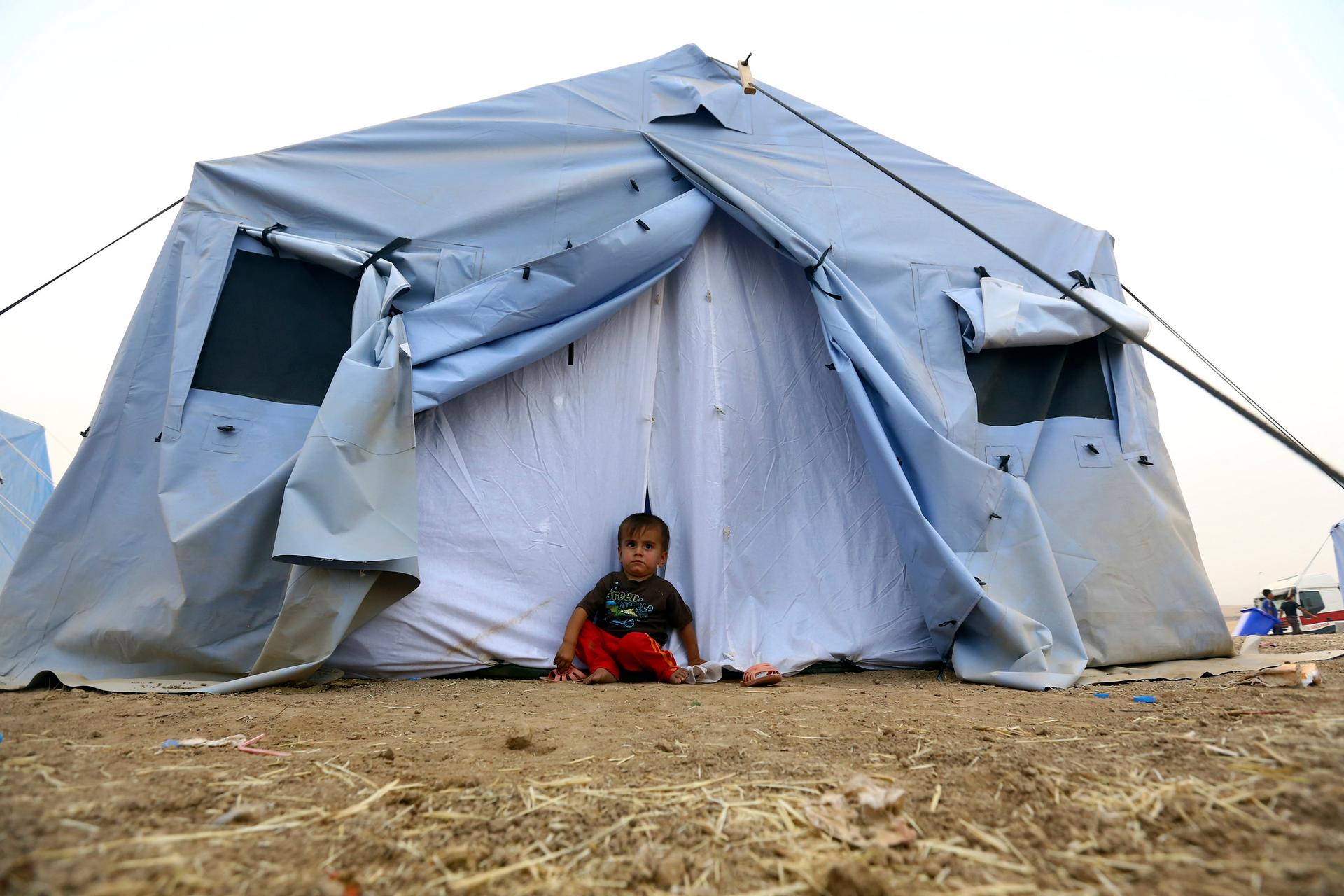Iraqis are feeling increasingly desperate with nowhere to turn
A boy who fled from the violence in Mosul sits outside a tent at a camp on the outskirts of Erbil in Iraq’s Kurdistan region.
With Sunnis jihadis capturing more and more territory in Iraq, there seems to be less and less chance that Sunnis, Shiites and Kurds can reconcile.
"The overwhelming feeling here is hoplessness, people are tired," said Global Post reporter Susannah George. "Most people who I talk to here say that Iraq as we know it, as a single unified country, is a thing of the past. It doesn't exist anymore."
The calls for division are especially strong from Kurdish leaders, who have long been angling for a state of their own.
But George said Sunnis have become increasingly disturbed by the current Iraqi government, lead by Shiite politician Nouri al-Maliki.
"His is a government that is increasingly sectarian, a government that oppresses them [Sunnis]. And then, also, you have a sense that people aren't fighting for a single nation, they're not fighting for a homeland," she said. "That's one of the reasons why, when you talk to Kurds, they say their Peshmurga forces are so effective, because they are fighting to protect their homeland."
George said what's motivating Shiites now to get involved is a call from influential cleric Ali al-Sistani to take up arms. But that just exacerbates the sectarian divide, because it means troops are fighting for their religious affiliations, not for their country.
Rhonda, a woman near Erbil in the Kurdish area, said, "you know what I say… I hate them all." She doesn't have faith in the United States either, calling this "an Iraqi matter, not an international problem."
It's funny, George said, "you're definitely hearing a combination of frustration with the United States — and with foreign intervention in general — but at the same time, a complete lack of faith in the other options, the government and the military, the institutions that are supposed to be protecting Iraq."
And yet, she said, after the fantastic collapse of the military in northern Iraq, the feeling is that the Iraqi army will never be able to bring order. That's leading people to feel increasingly desperate.
They're not bemoaning the lack of Saddam Hussein, but they would like a kind of strong man who could unify the country, George said.
With Sunnis jihadis capturing more and more territory in Iraq, there seems to be less and less chance that Sunnis, Shiites and Kurds can reconcile.
"The overwhelming feeling here is hoplessness, people are tired," said Global Post reporter Susannah George. "Most people who I talk to here say that Iraq as we know it, as a single unified country, is a thing of the past. It doesn't exist anymore."
The calls for division are especially strong from Kurdish leaders, who have long been angling for a state of their own.
But George said Sunnis have become increasingly disturbed by the current Iraqi government, lead by Shiite politician Nouri al-Maliki.
"His is a government that is increasingly sectarian, a government that oppresses them [Sunnis]. And then, also, you have a sense that people aren't fighting for a single nation, they're not fighting for a homeland," she said. "That's one of the reasons why, when you talk to Kurds, they say their Peshmurga forces are so effective, because they are fighting to protect their homeland."
George said what's motivating Shiites now to get involved is a call from influential cleric Ali al-Sistani to take up arms. But that just exacerbates the sectarian divide, because it means troops are fighting for their religious affiliations, not for their country.
Rhonda, a woman near Erbil in the Kurdish area, said, "you know what I say… I hate them all." She doesn't have faith in the United States either, calling this "an Iraqi matter, not an international problem."
It's funny, George said, "you're definitely hearing a combination of frustration with the United States — and with foreign intervention in general — but at the same time, a complete lack of faith in the other options, the government and the military, the institutions that are supposed to be protecting Iraq."
And yet, she said, after the fantastic collapse of the military in northern Iraq, the feeling is that the Iraqi army will never be able to bring order. That's leading people to feel increasingly desperate.
They're not bemoaning the lack of Saddam Hussein, but they would like a kind of strong man who could unify the country, George said.
Every day, reporters and producers at The World are hard at work bringing you human-centered news from across the globe. But we can’t do it without you. We need your support to ensure we can continue this work for another year.
Make a gift today, and you’ll help us unlock a matching gift of $67,000!
